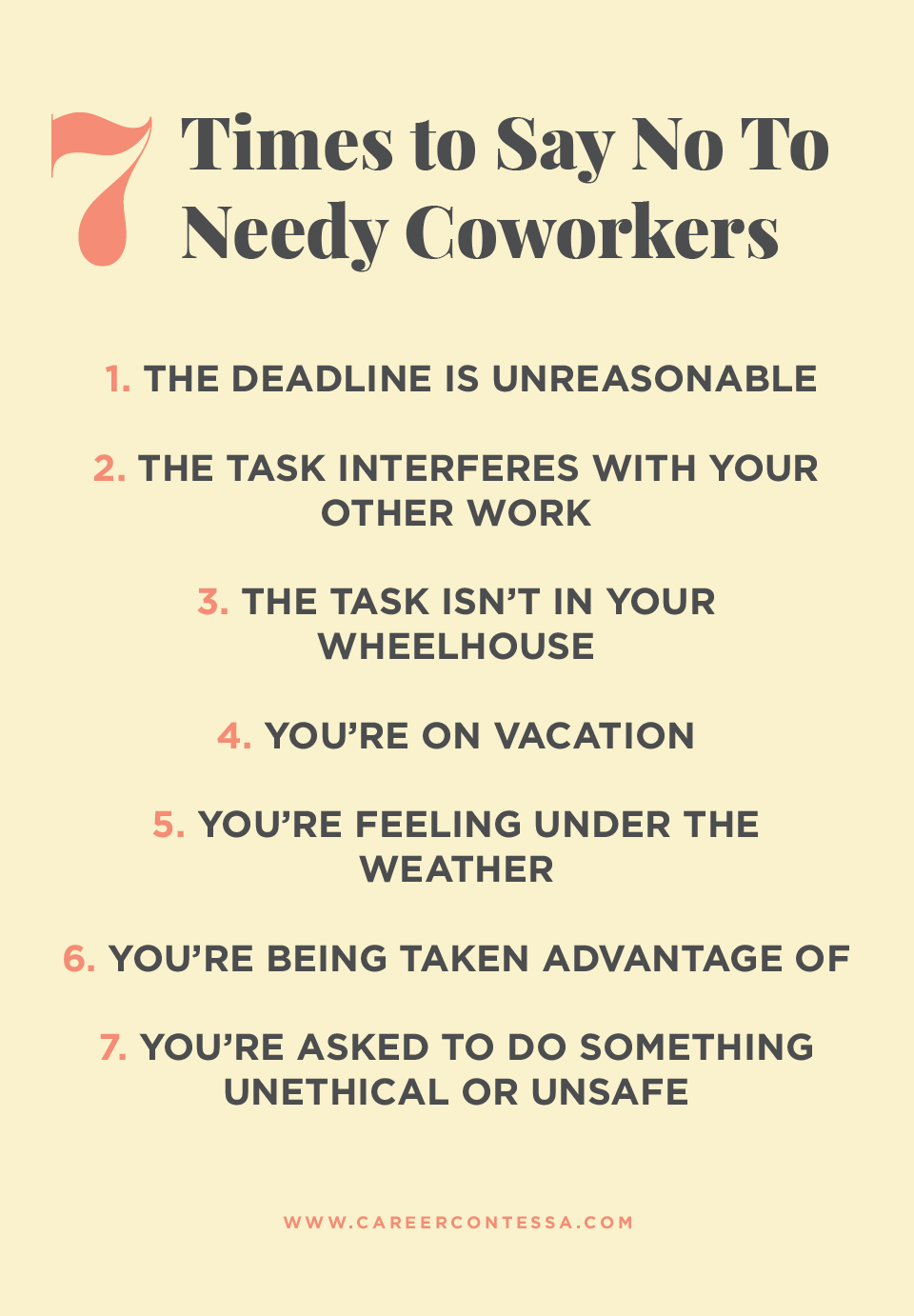We must get used to "No." as an entire sentence.
We shouldn't feel as though we need to have excuses or explanations lined up.
You're neck-deep in work. Suddenly, a coworker pops up at your desk or via instant messages. They're swamped, they explain. Can you take on a few additional tasks?
The answer? No.
This same coworker comes to you pretty regularly with short-term and high-priority work. You usually say yes because you are a team player.
Sounds familiar? Don't worry. Saying "No" is not easy for most of us. Turning down a boss or coworker often feels like turning down something else — usually a chance to prove that you're a competent and reliable employee. After all, successful people are the ones who say yes to everything, right?
Table of Contents
Why You're Having a Hard Time Saying No
If you can say "No" to the wrong things, you'll have more leeway to pursue the right ones. Before we go into specific scenarios, let's talk about the potential problems that led you to this article.
1. You Have Little to No Boundaries in Place
It's really difficult to set boundaries, especially when you're a new employee. We have a guide for
setting boundaries and keeping them solidly in place.
2. Your Communication Skills Need a Confidence Upgrade
We are pushing for "No" as a full sentence, because "No, but..." provides just enough crawlspace for a work shirker to find a way to still pawn their to-do list on you.
Try these simple and solid responses:
- I can't help you. I am swamped for the next few weeks.
- No, I have no space for additional work at the moment.
- No, I am on several deadlines.
3. You Are Too Much of a Team Player
We're stopping short of calling you a pushover because that's rude. However, ask yourself why your coworkers always come to you, breathless, with expectations that you'll not only pick up their extra work but that you will also make it your top priority.
The first time you say no might feel weird and somehow...wrong. However, by setting and maintaining boundaries, your workplace relationships will have a foundation of respect and communication. This is way preferable to a one-sided work relationship where your coworker relies on you as an easy alternative solution to their work management issues.
7 Examples Work Situations to Say "No" To
Now, let's explore common work situations that come up and how to use the powerful word "No" to fend off unreasonable requests now and in the future.
Because, as Steve Jobs said, "Deciding what not to do is as important as deciding what to do."
1. Someone Needs Last-Minute Help on an Unreasonable Deadline
Let's say you're asked to write a report within a day when it normally takes a week to complete. If you tried to meet a deadline that tight and ended up with a report that needs a ton of revisions, won't an extended deadline be a better solution?
How to Say No:
"Thanks for reaching out. Unfortunately, my workload does not allow for this SOW within the proposed deadline. If the deadline can be extended, I might be able to accommodate. Please let me know how to proceed."
2. The Task Interferes With Your Primary Work
You're already struggling to juggle everything on your plate. The last thing you need is someone butting in and insisting you do this and that "within the next five minutes." Since the person has that much time to convince you to do their work for them, it's probably more productive to let them do it on their own.
How to Say No:
"Thanks for thinking of me when it comes to this assignment. However, my current workload renders me unavailable to complete to the best of my ability."
3. The Task Is Not in Your Wheelhouse
Granted, you can learn how to do a completely unfamiliar task on the fly. But if you're asked to do something like write a thorough report on OSHA regulations within an hour, you're well within your rights to politely decline the assignment. Say something like, "Hey there, I'd like to help but this is beyond my expertise" and recommend someone else who's an expert.
How to Say No:
"I appreciate you thinking of me for this opportunity, but this is outside of my expertise. I don't believe I can accomplish this in the time frame. Might I suggest [NAME] for this opportunity? I know they are looking to get more involved in [SKILL or DEPARTMENT]."
4. You're on Vacation or PTO
Vacations are supposed to recharge you for the workplace. If you're answering emails in the middle of sunbathing in the Caribbean, you might as well not take time off at all. Let your coworkers know when you're on vacation and tell them to contact you only for urgent situations that need to be attended to ASAP.
How to Say No:
5. You're Sick
When you're sick, it's tempting to try powering through your workload anyway. But you'll do everyone—including yourself—a favor
if you choose to rest and recover instead. This way, your coworkers don't have to worry about you suddenly falling over in the office, and you don't have to worry about your illness getting worse.
How to Say No:
"Thanks for reaching out. However, I am currently out of the office with an illness and I will be taking the next few days to recover."
Saying "No" is going to be hard at first...But with practice and persistence, it'll prove to be one of the most valuable skills you'll ever learn.
6. You're Being Taken Advantage Of
It's okay to do small favors for coworkers once in a while. However, if you're starting to feel as overworked and under-appreciated as Anne Hathaway's character in
The Devil Wears Prada, that's a sign you need to put your foot down and
create boundaries. You're a skilled professional, not a glorified errand girl, so don't be afraid to let people know when they've crossed the line.
How to Say No:
"I appreciate that you look to me as a helpful resource. However, these favors are beginning to cause disruption in my main scope of work. I'd be happy to share with you my favorite time management tips, but I cannot continue to help with these types of tasks.
7. You're Being Asked to Do Something Unethical or Unsafe
Remember the
Enron fiasco? That's what happens when companies choose profit over principle. If you're regularly asked to do things that make you uneasy, consider looking for another job that's more in line with your personal values.
You can also try to stand your ground, as long as you're prepared to face a long, hard road ahead. The same goes for requests you feel are unsafe. If you are at all worried about your well-being, it’s okay to say no. Even if the task “meets regulations,” it could be unsafe considering OSHA doesn’t set hazard-specific standards.
How to Say No:
"Unless I am misunderstanding, I believe this ask is outside of our organization's code of conduct. I would appreciate you not involving me in this and I'd also advise you to give second thoughts as to what you are asking."
Pro Tip: Make sure to communicate this IN WRITING.
More Tips on Saying "No"
Even if you have a good reason for turning something down, it's still unnerving to do it in front of bosses and coworkers. You're not used to it, and your colleagues probably aren't either. Still, it's worth trying out these steps:
- Take a deep breath. This will put you in a state of mind where you can give a polite, reasonable refusal.
- Start with a sincere apology. Avoid padding it with wishy-washy words like "maybe" or "I'll do it later." Otherwise, that won't be the last time they'll pass the buck to you.
- Suggest alternatives. People always appreciate it when you do your best to help no matter what, rather than just complaining about it.
- Make your task-based calendar public. This way, the coworkers who love adding new tasks to your plate can see for themselves that you cannot take on an extra project.
For example, let's say a coworker suddenly got sick, so your boss gave you their workload instead. Since your plate is full already, you can't take on the extra work. Say, "I'm sorry, I can't do that given my current workload. But John Doe might be able to do it."
Saying "No" is going to be hard at first, especially if you're the
people-pleasing type. But with practice and persistence, it'll prove to be one of the most valuable skills you'll ever learn.













